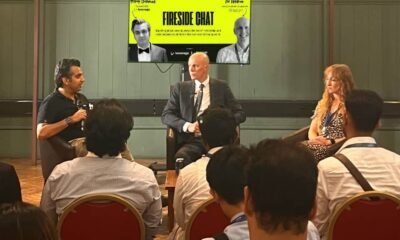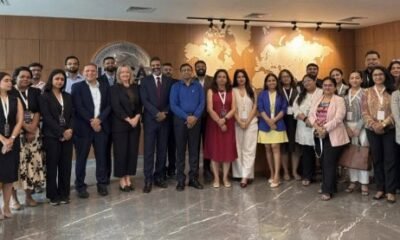Education
Manuel Barcia, University of Bath

Introduce yourself in three words or phrases.
Curious; efficient; good humoured.
What do you like most about your job?
I wake up each day knowing I’m building bridges (between continents, disciplines, perspectives, etc) and ensuring that research and education aren’t extractive but mutually enriching. Creating equitable global partnerships and seeing them develop from scratch is almost addictive.
Best work trip/Worst work trip?
Best: A trip to Ghana last year while I was still a dean at the University of Leeds. Not only did we manage to start something that I hope will blossom into a great partnership, but during our visit to Kumasi, we were invited by the KNUST’s vice-chancellor to attend the silver jubilee of their chancellor, who also happens to be the King of Asante.
For someone who is also working on a book on the First Anglo-Asante War (1823-31), getting the chance to attend this event, to join a dancing procession behind the Asante drummers as they exited the university hall, and to even shake the hand of the King, made this trip truly special.
Worst: There have been those inevitable times when a partner institution abruptly responds with bureaucracy or unequal expectations, perhaps a stalled collaboration because remote partners didn’t feel truly included. Frustrating, yes, but those are the moments that have reinforced my commitment to ethical partnership standards.
If you could learn a language instantly, which would you pick and why?
Basque. I have deep roots in the Bilbao region, and I would love to be able to go there and speak Euskera. It’s a very difficult language to learn, and sadly Duolingo doesn’t offer it yet, in spite of my multiple requests over the years.
What makes you get up in the morning?
The belief that higher education can lead global transformation if it’s inclusive and principled. Knowing that today I might start a conversation that empowers a researcher in the global south, or one that diversifies our student body, gets me out of bed. Also, I don’t underestimate the appeal of a good espresso before tackling time zones.
Champion/cheerleader which we should all follow and why?
Oh, there are many, many here I could name, but I think I am going to go with Vivienne Stern. Few people advocate for UK higher education with such clarity, diplomacy, and integrity, especially on the global stage. She understands the importance of international partnerships not as transactional arrangements, but as long-term relationships built on mutual respect.
Whether she’s in Westminster or representing us abroad, she always keeps the sector’s values front and centre – particularly around openness, inclusion, and academic freedom. Also, anyone who can keep their cool while explaining global student mobility to a Select Committee deserves applause, and possibly a medal.
Best international ed conference and why?
There are several conferences I could mention, but one that stands out is the inaugural Times Higher Education conference in Central Asia, held last autumn in Tashkent. It was the first event of its kind in a region that genuinely captivates me.
On a personal level, having grown up in Cuba, this was my first visit to the former Soviet socialist republics (I also visited Kazakhstan), and I was struck by how familiar it felt. I even got to see a welcoming Misha bear (the 1980s Olympics mascot) as soon as I hit the road there.
Professionally, it was equally memorable. Meeting so many colleagues from across the region, all passionately committed to transforming their institutions and improving opportunities for their students and peers, was a deeply affirming experience.
Book or podcast recommendation for others in the sector?
Well, as a historian perhaps my preferences here are a bit unusual. There are plenty of self-help books and podcasts now, many of them quite useful, giving advice as to how to be a good leader and warning about the potential pitfalls ahead of anyone making its way in the sector today.
To me, the book that does that better than any other is To Kill a Mockingbird, by Harper Lee. The way in which Atticus Finch, the protagonist, confronts the many challenges that come before him offers us a model of ethical leadership, integrity and courage that is second to none. A must-read for anyone wanting to become a better leader and person.
Worst conference food/beverage experience
I am not sure about food, but my worst beverage experience is coffee – any coffee – served in any conference, anywhere in the world. My personal challenge wherever I go is to find a place that serves a decent espresso, away from the so-called coffee I’ve found served at conferences everywhere so far. Definitely a sector-wide, global issue we may need to tackle as well.
Describe a project or initiative you’re currently working on that excites you.
At the University of Bath, I’m currently working with colleagues to develop a network of strategic global partners.
We’re looking for institutions that share our values and ambition; partners with whom we already have strong foundations of collaboration, and where there is clear potential to deepen that work through high-quality, high-impact research and, whenever possible, also student education. We’ve begun piecing the network together and holding initial conversations, which have been both exciting and full of promise.
Education
British Council undeterred after Russian strike “practically obliterated” Kyiv HQ

Speaking on August 29, two days after an attack on the Ukrainian capital in which at least 16 people were killed, the British Council’s director for the country, Colm McGivern, laid bare the impact on the organisation’s offices in Kyiv.
Standing outside the ravaged offices, which were severely damaged after Russian forces fired two missiles at it, McGivern said that the building had been “absolutely devastated – it’s been practically obliterated”.
While extending condolences to the families of those who died during the “horrific attack”, McGivern was firm in his resolve that the British Council’s work in Ukraine would continue even as the war with Russia wages on.
“I’d like to tell everyone that the British Council’s resolve is still there,” he said. “We will be here in Ukraine, we’ve been here 30 years. We’ll continue our work.”
He pointed out that the organisation did not stop its work in Ukraine following Russia’s invasion in 2022, and that this will not change. “To the contrary, we’re more determined than ever to make sure that cultural and educational links between the UK and Ukraine can thrive, not just survive,” he said.
He pledged that an upcoming British Council event in Lviv, located in the west of Ukraine, would take place this week as planned, as well as promising young Ukrainians that face-to-face learning would also resume in the coming days.”We will keep those promises. We will start those classes,” he stressed.
McGivern extended best wishes to a British Council colleague who had been injured on the evening of the attack, who he said was recovering in hospital. And he said his team had been overwhelmed by the support they had received from the international education community, as well as the Ukrainian first responders and emergency services who helped in the immediate aftermath of the attack.
There has been an outpouring of support for British Council colleagues in Ukraine by the international education community.
Our work will not stop now because of this horrific attack. To the contrary, we’re more determined than ever
Colm McGivern, British Council
Gwen van der Helden, a professor of education reconstruction during/post war, crisis and conflict at the University of Warwick and a visiting professor at V. N. Karazin Kharkiv National University, expressed her shock.
“The BC is hardly of military interest, not a danger to anyone, and the people working there do nothing than trying to contribute to the future of fellow citizens. It is utter codswallop to think that the BC is in any way a reasonable target. But then, so few of the targets that have been hit in this war have been,” she wrote on LinkedIn.
“Furious is how we should all feel at this point. Our colleagues in Kyiv (and yes I do think we should regard BC colleagues as exactly that), deserve better.
Sending courage, strength and a large portion of defiance to our British Council colleagues.”
The British Council’s mission in Ukraine offers English language programs and other training or educational programs. In June, Russia made accusations that it was being used as a cover for British intelligence operations in Kyiv.
After the attack, British Council chief executive Scott McDonald confirmed that bombing in the city had damaged its offices.
“Our guard was injured and is shaken but stable. At the insistence of my amazing colleagues, we will continue operations in Ukraine today wherever possible,” he said.
Meanwhile, European leaders have condemned the strike, which saw 629 missiles and drones launched at the city.
President of the European Council, António Costa, confirmed that the British Council’s Ukrainian office “was damaged in this deliberate Russian strike”, while UK Prime Minister Keir Starmer hit out at Vladimir Putin – accusing him of “sabotaging peace”.
Education
Top UK unis partner on career initiatives for India and China

The University of Birmingham, home to over 2,000 Indian students, has partnered with the University of Glasgow to create a new in-country role in India employability relationship manager – who will be responsible for building links with employers, career services, and alumni networks to help graduates succeed in the local job market.
According to a joint statement issued by the institutions, graduates will be offered practical support through pre-entry briefings, skills development programs, and post-graduation engagement.
The two universities have also launched an exclusive partnership with the Chinese graduate career support organisation, JOBShaigui.
The career portal, well regarded in China for its links to top employers, will offer a range of bespoke services, including online seminars with the latest job market insights, guidance on recruitment processes, access to an extensive employer network, and in-country networking events with alumni and employers.
Both Birmingham and Glasgow, ranked among the QS global top 100, see China and India, with their combined 400,000 alumni worldwide, as priority markets.
Offering enhanced career support is seen as crucial, as recent trends show a majority of students from these countries are choosing to return home after their study abroad journey.
“More and more students, quite reasonably, are saying: I want to know what my employment prospects are after getting a degree. We do a lot to prepare students for their future careers while they study with us, but it has become increasingly clear that we must also support them after they graduate,” Robin Mason, pro-vice-chancellor (international) at the University of Birmingham, told The PIE News.
“Our two largest cohorts of international students are from China and India, so we said: for these two really important countries, we’re going to create in-country support for careers and employability career fairs, interview preparation, CV workshops, all those sorts of things.”
Increasingly, after that period of work in the UK, Indian graduates are looking to come back home to India
Robin Mason, University of Birmingham
While both Birmingham and Glasgow already collaborate on joint research, particularly in the medical field, the career support initiative made sense as the cost could be shared between the two universities, according to Mason.
Moreover, the universities expect the initiative to be particularly successful in India, from where students make up the largest cohort of graduate visa holders.
“Particularly Indian students, more than Chinese students, want to stay in the UK after graduation. But increasingly, after that period of work in the UK, Indian graduates are looking to come back home to India,” stated Mason.
According to Mason, while most Indian students prefer fields such as computer science, data science, engineering, business management, finance, economics, and health-related subjects, in principle students of any discipline, “even classics, English, or history”, will be supported equally in their careers back in India.
The initiatives also come at a time when international students in the UK are being urged to “sharpen their skills” for both the UK and global job markets, as employers increasingly look beyond “textbook skills” to focus on a candidate’s ability to bring innovation to the table.
Further plans in India for University of Birmingham
Although the University of Birmingham operates an overseas campus in Dubai, an attractive option for Indian students given its proximity to the UK and large Indian community, the institution has no plans to establish a campus in India anytime soon.
Instead, it is focusing on initiatives such as the in-country employability role and partnerships with local institutions.
While the University of Birmingham offers dual degrees with Jinan University in China in fields such as maths, economics, statistics, and computing, it is now exploring a partnership with IIT Bombay in India in areas such as quantum technology, energy systems, AI, and healthcare, building on its successful venture with IIT Madras.
“If you do it properly, campuses are very expensive things. I don’t think you do these things lightly. You have to make the investment and be there for the long term,” said Mason. “Birmingham is 125 years old this year, and you need to be thinking in terms of decades if you’re going to build a campus. It’s a really long-term commitment because it takes so much time and investment to build a high-quality university.”
As part of its 125-year celebrations, the institution also announced scholarships for Indian students, offering funding of £4,000 to £5,000 for a wide range of postgraduate taught master’s degrees starting in September 2025.
“As part of our 125th anniversary celebrations, we introduced a special scholarship, offering up to 40% funding for students joining our Dubai campus,” stated Devesh Anand, regional director, South Asia and Middle East, University of Birmingham.
“This was combined with academic and merit-based scholarships, giving students the opportunity to access multiple forms of support. The response has been fantastic, as students saw it as a real achievement and recognition of their efforts.”
The number of Indian students studying in the UK remains high, with the Home Office data showing 98,014 study visas granted in the year ending June 2025.
However, not everything is rosy, as students are increasingly concerned about their future in light of the immigration white paper, which proposes reducing the Graduate Route by six months and imposing a levy on international student fees.
In such a situation, the aim for institutions like the University of Birmingham is to remain attractive to graduates seeking employment opportunities.
“What we have to ensure is that University of Birmingham graduates are career-ready and can get the sorts of jobs that allow them to continue working in the UK if they want to, so they can be sponsored by an employer at the required graduate-level salary,” said Mason.
“To put it delicately, I think the universities that will struggle with the immigration changes are those not paying enough attention to employability. If your graduates are employable, it’s not an issue.”
Education
British Council office in Ukraine hit by Russian missile

Watch as British Council director for Ukraine Colm McGivern, describes the devastation to offices in central Kiev caused by a Russian missile strike. Despite the damage he reiterates the UK’s support for Ukraine and reaffirms the British Council’s work will continue.
-

 Business3 days ago
Business3 days agoThe Guardian view on Trump and the Fed: independence is no substitute for accountability | Editorial
-
Tools & Platforms3 weeks ago
Building Trust in Military AI Starts with Opening the Black Box – War on the Rocks
-

 Ethics & Policy1 month ago
Ethics & Policy1 month agoSDAIA Supports Saudi Arabia’s Leadership in Shaping Global AI Ethics, Policy, and Research – وكالة الأنباء السعودية
-

 Events & Conferences3 months ago
Events & Conferences3 months agoJourney to 1000 models: Scaling Instagram’s recommendation system
-

 Jobs & Careers2 months ago
Jobs & Careers2 months agoMumbai-based Perplexity Alternative Has 60k+ Users Without Funding
-

 Funding & Business2 months ago
Funding & Business2 months agoKayak and Expedia race to build AI travel agents that turn social posts into itineraries
-

 Education2 months ago
Education2 months agoVEX Robotics launches AI-powered classroom robotics system
-

 Podcasts & Talks2 months ago
Podcasts & Talks2 months agoHappy 4th of July! 🎆 Made with Veo 3 in Gemini
-

 Podcasts & Talks2 months ago
Podcasts & Talks2 months agoOpenAI 🤝 @teamganassi
-

 Mergers & Acquisitions2 months ago
Mergers & Acquisitions2 months agoDonald Trump suggests US government review subsidies to Elon Musk’s companies



















